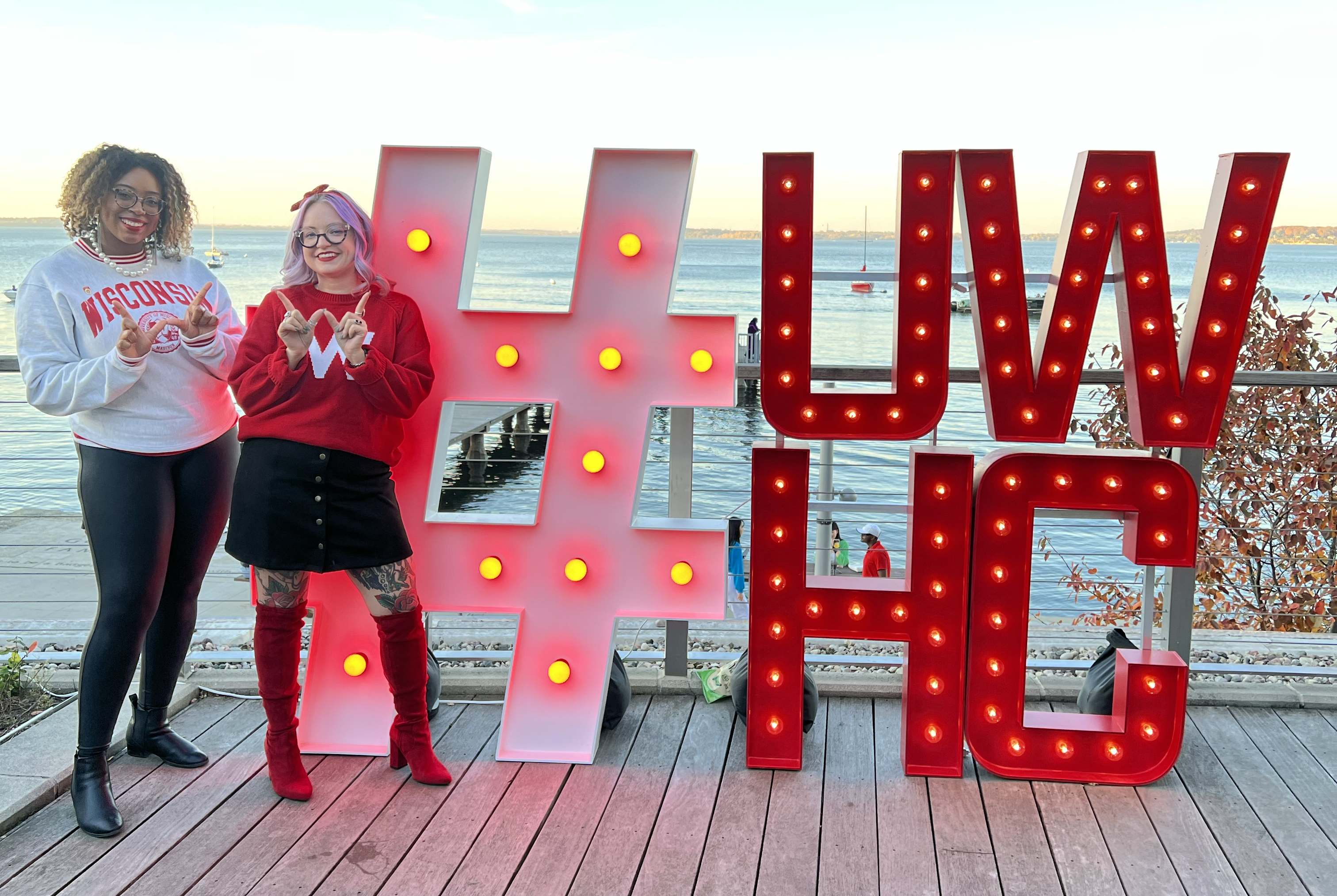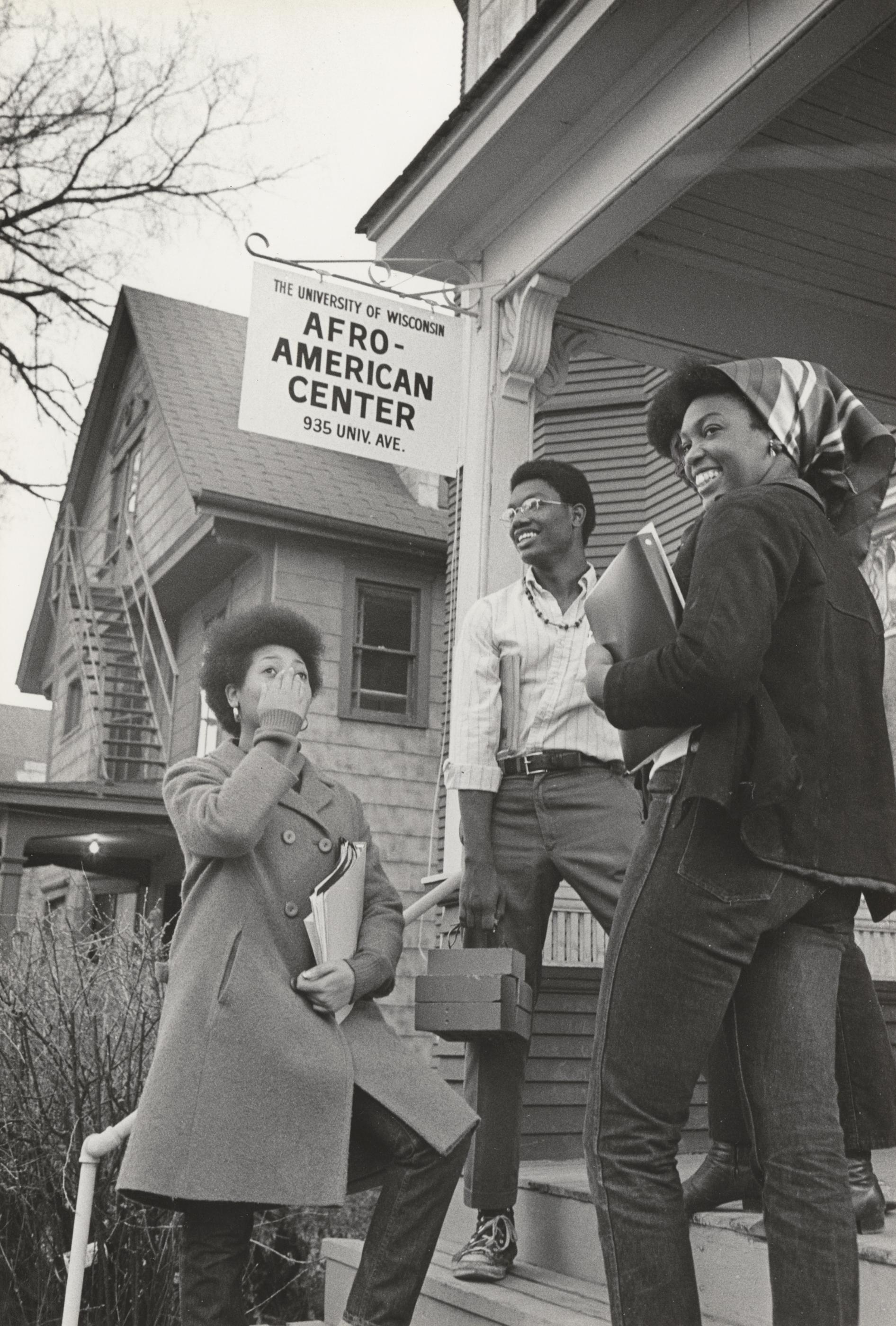Greetings from the Public History Project! With the fall semester in full swing, we have a ton of exciting stuff going on (have we mentioned Sifting & Reckoning, our exhibit currently on view at the Chazen Museum of Art?) and plenty to share in this month’s newsletter: can’t-miss events, Homecoming highlights, archival finds, new book recommendations, and more!
The University of Wisconsin–Madison’s Public History Project is a multi-year effort to uncover and give voice to those who experienced, challenged, and overcame prejudice on campus. As always, if you have a story to share, an event you think should be researched, or a person you think has been overlooked, please email us at publichistoryproject@wisc.edu.
|
|
|

|
The Public History Project's Taylor Bailey, left, and Kacie Lucchini Butcher at the UW Multicultural Homecoming
|
The Public History Project was thrilled to be a part of this year’s Multicultural Homecoming festivities over the weekend! Aside from enjoying great company, food and watching the Badgers come out on top, PHP staff got to share news about the Project and the Sifting & Reckoning exhibit with the campus community!
|
|
|
|
|
|
Sure, traditions come and go, and there were still plenty of great Homecoming festivities going on over the weekend, but what happened to the elaborate, often strange crepe paper creations put on display to intimidate and/or mock opponents for the big game?
Just check out these archival photos from the 1950s-1970s showing Homecoming decoration contest entries created by students with Bucky chomping, roasting and moonshine-ing rivals.
|
|
|
|
Homecoming decorations from 1953, (top left), 1954 and 1974. UW–Madison Archives.
|
|
|
|
|
|
Events! There’s always something happening on campus, but there are a couple of events coming up that are not to be missed:
|
|
|
|
An Evening with Clint Smith
Join this year's Go Big Read author, Clint Smith, for his keynote visit to UW–Madison. Smith is the author of this year's campus book "How the Word is Passed", a deeply researched and transporting nonfiction exploration of the legacy of slavery and its imprint on centuries of American history.
The event is free and open to the public, and will be livestreamed online.
Tuesday, November 1 – 7:00pm
Shannon Hall Theater at the Memorial Union
|
|
|
|
Diversity Forum
The annual Diversity Forum conference takes place this year on campus and virtually November 14 and 15. The 2022 event, “The Power of Remembering: Reclaiming Our Legacies to Imagine New Futures,” will feature a keynote address by Harvard historian and author Dr. Tiya Miles and a special reception for in-person attendees at the Public History Project’s Sifting & Reckoning exhibit at the Chazen Museum of Art.
|
|
|
|
|
|
Each month, we like to share one of the many (many… many… ) books that have helped the Public History Project’s research.
For this edition of the newsletter, we’re recommending The Company He Keeps: A History of White College Fraternities by Nicholas L. Syrett. The book traces the history of traditionally white college fraternities in America from their days in antebellum all-male schools to sprawling modern-day college campuses, and reveals how fraternity brothers have defined masculinity over the course of their 180-year history.
Syrett explores factors such as class, religiosity, race, sexuality, and recklessness that have defined particular versions of fraternal masculinity and examines the ways tit has had consequences for other students on campus as well, emphasizing the exclusion of different groups of classmates and the sexual exploitation of female college students.
|
|
|
|
We get asked a lot of questions about UW history. Each month we’ll answer one in the newsletter. This month, someone wondered:
What’s the story of the original Black Cultural Center at UW and the fire at its first location? Was there an investigation? What was the response like from campus?
The answer: In the predawn hours of February 19, 1969, the original Black Cultural Center at UW–Madison, then called the Afro-American and Race Relations Center, was set on fire. The center had become a cultural hub for Black students and one of the main organizing locations for the 1969 Black Student Strike. The Center was so badly damaged that it was forced to move before it was eventually closed in 1974 by the university, alleging that it promoted “separatism.” While both Black and white students had criticized the original center as an inadequate space, students pointed to the blaze as a sign of rising racial tensions on campus. Arson was suspected and investigated but never proved.
Got a question? Email us publichistoryproject@wisc.edu.
|

|
Four students stand on the porch of the former Afro-American Community Center at 935 University Ave. UW–Madison Archives
|
|
|
|
Each month the Project's Director, Kacie Lucchini Butcher will share a book, podcast, movie, quote, or something else she think has been adding to the PHP. We're calling it "From The Desk of KLB"
This month From The Desk of KLB, a special highlight of the work of Dr. Tiya Miles, the keynote speaker for this year’s upcoming Diversity Forum.
Miles’ All That She Carried, winner of the National Book Award, is a deeply researched and deeply moving testament to people who are left out of the archives. The book traces the life of a single object – a cotton sack – handed down through three generations of Black women, and in doing so, brings to life a singular history of the experience of slavery, and the uncertain freedom afterward, in the United States.
|
|
|
|
As always, if you have a story to share, an event you think should be researched, or a person you think has been overlooked, please email us at publichistoryproject@wisc.edu.
|
|
|
|
|